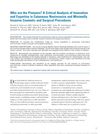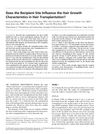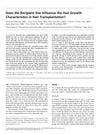1 citations,
December 2023 in “International journal of molecular sciences” miR-199a-3p controls hair growth and is linked to alopecia areata.
 November 2023 in “Materials Today Bio”
November 2023 in “Materials Today Bio” Light therapy might help treat hereditary hair loss by improving hair follicle growth in lab cultures.
 January 2023 in “Springer eBooks”
January 2023 in “Springer eBooks” Hair restoration surgery can effectively treat hair loss in women.
 82 citations,
May 2016 in “Best Practice & Research in Clinical Obstetrics & Gynaecology”
82 citations,
May 2016 in “Best Practice & Research in Clinical Obstetrics & Gynaecology” The conclusion is that managing androgen excess requires long-term treatment, including hormonal contraceptives and androgen blockers, with follow-up after six months.

Non-invasive methods can effectively diagnose and manage alopecia areata.
 January 2020 in “Journal of Cosmetics, Dermatological Sciences and Applications”
January 2020 in “Journal of Cosmetics, Dermatological Sciences and Applications” DEEPLY ROOTED® supplement seems to effectively improve hair growth and quality in women with no side effects.

Nanocarriers with plant extracts show promise for safe and effective hair growth treatment.
 August 2022 in “IntechOpen eBooks”
August 2022 in “IntechOpen eBooks” The best treatment for Frontal Fibrosing Alopecia and Lichen Planopilaris combines oral and topical medications to reduce symptoms and stop hair loss.
11 citations,
February 2018 in “Medical science monitor” An alternating inflatable head pad reduced pressure ulcers and hair loss in heart surgery patients.
 January 2024 in “Journal of Cosmetic Dermatology”
January 2024 in “Journal of Cosmetic Dermatology” Platelet-rich plasma may improve hair density and count in male pattern hair loss, but more high-quality research is needed.
 4 citations,
May 2020 in “Annals of palliative medicine”
4 citations,
May 2020 in “Annals of palliative medicine” Plum blossom needle acupuncture with qi-invigorating therapy is more effective for Seborrheic Alopecia than Western medicine.
 12 citations,
January 2016 in “Journal of Clinical and Investigative Dermatology”
12 citations,
January 2016 in “Journal of Clinical and Investigative Dermatology” Low vitamin D levels are common in people with Alopecia Areata.
 257 citations,
July 2018 in “Obstetrics & Gynecology”
257 citations,
July 2018 in “Obstetrics & Gynecology” PCOS is a complex disorder in women that can lead to various health risks and requires personalized treatment.
 March 2014 in “Hair transplant forum international”
March 2014 in “Hair transplant forum international” Hair transplant surgeons should also focus on their patients' overall health, including regular check-ups and screening for common health issues.
 15 citations,
February 2016 in “Dermatologic Surgery”
15 citations,
February 2016 in “Dermatologic Surgery” Dermatologists are the main innovators in noninvasive cosmetic procedures, with other specialties also contributing significantly.
 24 citations,
September 2002 in “Dermatologic Surgery”
24 citations,
September 2002 in “Dermatologic Surgery” The place where hair is transplanted can affect its growth and survival rates.
 September 2002 in “Dermatologic Surgery”
September 2002 in “Dermatologic Surgery” The recipient site can affect the growth and survival of transplanted hair but not its thickness.
 2 citations,
June 2000 in “Journal of Oral and Maxillofacial Surgery”
2 citations,
June 2000 in “Journal of Oral and Maxillofacial Surgery” Hair transplantation techniques have improved over time, leading to natural-looking results and high graft survival rates, making it a popular treatment for hair loss.
 25 citations,
January 2009 in “Oral and Maxillofacial Surgery Clinics of North America”
25 citations,
January 2009 in “Oral and Maxillofacial Surgery Clinics of North America” Successful hair transplant surgery depends on careful patient selection, proper surgical plan and technique, and attentive aftercare.
 7 citations,
October 2011 in “International Surgery”
7 citations,
October 2011 in “International Surgery” In 2011, hair restoration was a specialized field in plastic surgery, using techniques like "Ultrarefined follicular unit hair transplantation" to minimize scarring and promote hair growth, with future treatments like stem cell therapy and hair cloning still being tested.
 15 citations,
July 2020 in “Dermatologic Therapy”
15 citations,
July 2020 in “Dermatologic Therapy” FPHL is common in women, influenced by genetics and hormones, and can be treated with medications, laser therapy, or hair transplantation.
 1 citations,
October 2021 in “Cosmoderma”
1 citations,
October 2021 in “Cosmoderma” Hair transplants can work for permanent hair loss if the condition is stable and done carefully.
 101 citations,
January 1997 in “Journal of Investigative Dermatology Symposium Proceedings”
101 citations,
January 1997 in “Journal of Investigative Dermatology Symposium Proceedings” Nerves and chemicals in the body can affect hair growth and loss.
 40 citations,
August 2018 in “Skin appendage disorders”
40 citations,
August 2018 in “Skin appendage disorders” Some alternative treatments for hair loss might work, but more research is needed.
 3 citations,
March 2014 in “Annals of Hepatology”
3 citations,
March 2014 in “Annals of Hepatology” A man lost all his hair after stopping hepatitis C treatment and it didn't grow back.
 September 2014 in “Hair transplant forum international”
September 2014 in “Hair transplant forum international” Caffeine, niacinamide, and panthenol may improve hair growth, fullness, and healing when applied to the scalp.
 1 citations,
May 2012 in “Hair transplant forum international”
1 citations,
May 2012 in “Hair transplant forum international” Hair loss in men may be caused by inflammation triggered by hormones, and treatments reducing inflammation could potentially promote hair growth.
 21 citations,
June 2009 in “Current Medical Research and Opinion”
21 citations,
June 2009 in “Current Medical Research and Opinion” Most men with hair loss worry, try self-treatments, and delay doctor visits due to cost, uncertainty, and embarrassment.
 185 citations,
August 2005 in “Autoimmunity Reviews”
185 citations,
August 2005 in “Autoimmunity Reviews” Alopecia areata is an autoimmune condition causing hair loss due to the immune system attacking hair follicles, often influenced by genetics and stress.
 20 citations,
September 1978 in “International Journal of Dermatology”
20 citations,
September 1978 in “International Journal of Dermatology” Hair growth is influenced by factors like genetics and nutrition, and more research is needed to understand hair loss and growth mechanisms.



























